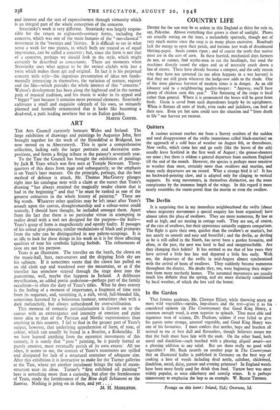COUNTRY LIFE
DESIRE for the sun may be as ardent in this England as thirst for rain in, say, Palestine. Almost everything that grows is short of sunlight. Plums are actually rotting on the trees, a melancholy spectacle, though not of very much matter since the crop is in many places excessive. Rosebuds lack the energy to open their petals, and become just wads of discoloured blotting-paper. Seeds cannot ripen ; and of course the seeds that matter most are in the ears of corn. In these hurried, mechanical days-farmers do not, or cannot, find scythe-men to cut the headlands, but send the machines directly round the edges and so of necessity crush down a line of straws. These have already become a compost, and the only reason why they have not sprouted (as too often happens in a wet harvest) is that they are still green wherever the hedge-row adds to the shade. One of the most glorious harvests of modern times is in danger. As an old labourer said to a neighbouring poultry-keeper: "Anyway, you'll have plenty of chicken corn this year." The flattening of the crops is local rather than general. Where it is pronounced the losses will be great from birds. Grain is saved from such depredators largely by its uprightness. When it flattens all sorts of birds, even rooks and jackdaws, can feed at their ease. Even yet hot suns could save the situation and "from death to life" our harvest yet recover.


































 Previous page
Previous page